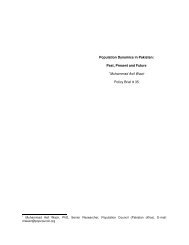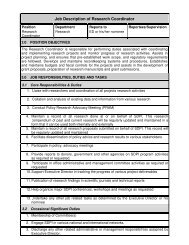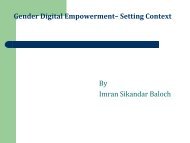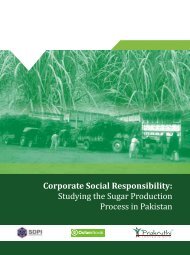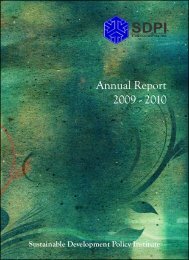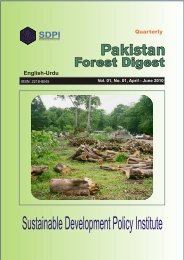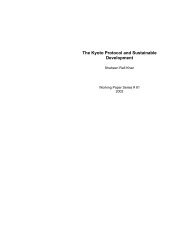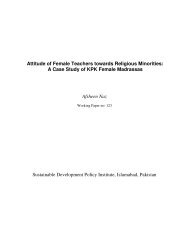Mr. Khalid A. Mirza's opening remarks - SDPI
Mr. Khalid A. Mirza's opening remarks - SDPI
Mr. Khalid A. Mirza's opening remarks - SDPI
You also want an ePaper? Increase the reach of your titles
YUMPU automatically turns print PDFs into web optimized ePapers that Google loves.
1<br />
SAES-V: COMPETITION LAW & POLICY IN SOUTH ASIA (OPENING SPEECH<br />
AS CHAIRMAN) (September 12, 2012)<br />
First of all, I would like to thank <strong>SDPI</strong> for the honor and privilege of chairing this<br />
panel discussion on “Competition Law and Policy in South Asia”.<br />
<br />
For me, competition law and policy is a most fascinating subject. I have worked<br />
in this area while at the World Bank; I have been the last Chairman of Pakistan’s<br />
Monopoly Control Authority and the first Chairman of Pakistan’s modern<br />
Competition Commission; I have been a consultant on competition issues and I<br />
am now a Member of the newly formed Competition Appellate Tribunal. I find<br />
that on this panel, other than me, there is at least one person who is passionately<br />
committed to this subject, and that is my friend, <strong>Mr</strong>. Pradeep Mehta, the founder<br />
of CUTS International. He will be the first speaker to be followed by <strong>Mr</strong>. Iqbal<br />
Tabish, the Secretary-General of the SAARC Chamber of Commerce, who I<br />
expect will express the views of the private sector on this subject --- their hopes,<br />
fears and expectations; and what value, if any, the private sector attaches to<br />
Competition Law Authority. Thereafter, three eminent speakers --- <strong>Mr</strong><br />
Mohammad Abdullah Rehan from Bangladesh, <strong>Mr</strong> Paras Kharel of Nepal, and<br />
my former colleague and friend, Dr Joseph Wilson from Pakistan’s Competition<br />
Commission --- will present their perspectives on the subject.<br />
Before I request <strong>Mr</strong>. Mehta to take the floor, I would like to give, by way of<br />
background, a brief synopsis of the importance of competition enforcement, the
2<br />
challenges in this connection faced in South Asia, the progress made and current<br />
status, and what needs to be done to take the matter forward.<br />
<br />
If we are to rely on the private sector as the engine for achieving growth and<br />
prosperity, it is necessary to ensure that markets function efficaciously, that they<br />
are not dysfunctional and that they facilitate free, fair and transparent<br />
contestability among all economic agents on a level playing field --- this is<br />
widely regarded as essential to the achievement economic efficiency.<br />
Competition naturally results in improved productive technologies, enhanced<br />
quality of product, and greater production volumes on a more cost efficient basis -<br />
-- thus a crucial element of competitiveness is competition i.e. economic agents<br />
freely vying with each other, and in rivalry with each other, for greater market<br />
share or relative market supremacy.<br />
<br />
Competition is at the core of the market system: without contestability and rivalry<br />
among economic agents on a level playing field, productivity is bound to suffer --<br />
- and so is the consumer. Competition is embedded in markets that function well,<br />
that allow the smooth entry and exit of economic agents, and that, therefore,<br />
naturally encourage entrepreneurship, an essential element of market-led<br />
economic growth. Along with sector-specific regulation, as needed, instituting a<br />
modern competition law and its due enforcement is key to ensuring that markets<br />
function efficiently, entrepreneurship flourishes at all levels, and the economy<br />
grows and prospers. An important element of modern economic management is<br />
the institution of polices that harness the process of competition and eschew those<br />
seeking to subvert this process.
3<br />
<br />
It is noteworthy that while the “consumer protection” aspect of competition law<br />
and policy has caught the public imagination and is widely recognized, what is<br />
hidden from view is the fact that modern competition laws are really designed to<br />
promote and facilitate businesses and the main beneficiaries are business<br />
enterprises. One often forgets that competition laws protect all consumers, not<br />
merely the lay or individual consumer at the retail level. Actually, business houses<br />
sit on both sides of the demand-supply equation --- they are producers and<br />
suppliers as well as consumers.<br />
<br />
It is clear that the relevant Government authorities in South Asia now recognize<br />
the need for, and importance of, competition law enforcement though the progress<br />
made in this respect varies widely from country to country. The competition<br />
regimes in South Asia are neither homogenous nor at a similar stage of<br />
development. Previously, since the late sixties and early seventies, India,<br />
Pakistan, and Bangladesh had in place old style, moribund, normative,<br />
prescriptive and somewhat ineffective anti-monopoly laws.<br />
<br />
India was the first to introduce modern competition legislation in 2002. However,<br />
this got bogged down by legal challenges and wrangles, but after necessary<br />
amendments --- required by the Indian Supreme Court and eventually legislated<br />
by Parliament -- the Indian Competition Commission and the Indian Competition<br />
Appellate Tribunal were duly constituted and are now in full swing.
4<br />
<br />
Pakistan’s new competition law --- which is based on the principles embodied in<br />
the Treaty of Rome and has striking similarities as well as dissimilarities as<br />
compared with the Indian legislation --- was initially promulgated as a<br />
Presidential Ordinance in 2007, and later, after being re-promulgated twice, it<br />
was, as directed by the Supreme Court, duly enacted by Parliament in October,<br />
2010. During its first five years, Pakistan’s Competition Commission has been<br />
able to vigorously enforce and implement all aspects of the law and is widely<br />
acknowledged to have operated at close to globally accepted standards of agency<br />
effectiveness. Also, a Competition Appellate Tribunal has also been constituted<br />
as stipulated in the law.<br />
<br />
Bangladesh has only this year enacted a modern competition law. Sri Lanka’s<br />
previous, long-standing, fair trade legislation was replaced in 2003 by a new law<br />
with a strong consumer orientation but without significant elements like, for<br />
instance, merger control. And Nepal has had a law to promote and enforce<br />
competition since 2007 and the Nepalese Competition Board has engaged in<br />
efforts to implement this law.<br />
<br />
Broadly speaking, from what I have observed, the challenges entailed in<br />
introducing and implementing a modern competition regime in South Asia are<br />
firstly, cultural, and secondly, socio-political. As regards the cultural aspect, the<br />
entire outlook and approach in South Asia is remarkably feudal despite the fact<br />
that large swathes of South Asia have either been socialist for considerable<br />
periods of time or have flirted shamelessly with socialism. Asians are not fazed
5<br />
by abuse of dominance, collusive behavior, exploitation etc albeit they would<br />
consider it shocking if those with wealth and power were not charitable towards<br />
the needy and the dispossessed. This is the way the cookie crumbles in South<br />
Asia; this is the Asian paradigm. It is worth noting that South Asians cannot<br />
distinguish between “profits” and “profiteering” --- it is all the same to them!<br />
Thus, Robber Barons are generally-speaking acceptable in South Asia as long as<br />
they are the giving sort!<br />
<br />
Most people in South Asia appear to take anti-competitive behavior and<br />
exploitative conduct in their stride and consider it a part of life. Thus<br />
competition or anti-trust enforcement does not come naturally to Asians.<br />
<br />
Now, as regards the socio-political dimension:<br />
- firstly, South Asian Governments find it hard to truly and genuinely<br />
accept a competition agency’s independence and the agency is constantly<br />
fighting a rearguard battle to remain independent;<br />
- secondly, the political will to support a competition agency discharge its<br />
responsibilities is weak and indeterminate, and is often undermined by<br />
other, perhaps, conflicting priorities, cronyism etc.;<br />
- thirdly, competition agencies are without access to tied and secure sources<br />
of funding and are thus unable to implement credible enforcement and<br />
advocacy programs;
6<br />
- fourthly, the judicial system just does not work thereby hampering the<br />
competition agency’s ability to enforce. Unpredictability, inordinate delays,<br />
over emphasis on procedure over substance, total apathy, and rank<br />
ineptitude are the hallmarks of the judiciary in many South Asian countries<br />
adversely affecting the work of competition agencies;<br />
- fifthly, sector-specific regulators and other Government agencies often<br />
violate the competition law in letter or in spirit posing an enormous hurdle<br />
for the competition agency; and<br />
- sixthly, building and sustaining an agency with credible capacity to<br />
deliver is largely constrained by the scarcity of much-needed skilled and<br />
competent professionals such as micro-economists, forensic accountants,<br />
lawyers, financial analysts, IT experts, and PR people.<br />
<br />
You will appreciate that in such a formidable environment, a competition agency<br />
operates from the back foot, and does not have the luxury of adopting any kind of<br />
a holistic “integrated compliance strategy” or an over-arching, problem-solving<br />
approach based on identified concentrations, vulnerabilities, patterns of noncompliance.<br />
Of necessity, at present most Asian competition agencies would<br />
have to take a reactive approach and deal with whatever comes through the door.<br />
Later, with a little more sophistication, an agency may graduate just one step to<br />
“picking important problems and fixing them”.<br />
<br />
Clearly, most competition agencies in the region need a lot of capacity building to<br />
achieve optimal levels of agency effectiveness. This is apart from the need to
7<br />
ensure that these agencies are endowed with competent, bold and gutsy leadership<br />
fully capable of attracting, motivating and stimulating professional staff to higher<br />
and higher levels of performance.<br />
Further, now that concerted efforts are being made to increase the volume of trade<br />
and investments, and other forms of economic interaction within the SAARC<br />
region, it would not only make sense for competition authorities to co-operate<br />
with each other in their efforts to enforce competition norms at the operational<br />
level but also SAARC Governments must develop viable mechanisms to<br />
calibrate their policy actions, in particular with regard to State aid or support<br />
provided to national enterprises, so as to achieve the goal of a level playing field<br />
for all economic agents across the region.<br />
<br />
As a first step in the direction of regional co-operation, I had suggested in<br />
January, 2010, the setting up of a South Asia Competition Network which would<br />
be a forum for exchange of views on matters of mutual interest, and to determine<br />
ways of co-operating and supporting each other in order to enhance operational<br />
effectiveness at the regional level. It would also<br />
highlight the peculiar issues<br />
and sensibilities of this region so that these aspects are fully taken into<br />
consideration in the determination of global standards for enforcement of<br />
competition norms. The upcoming World Competition Day on December 5 th ,<br />
conceived and strongly promoted by Pradep Mehta against all odds, would be<br />
propitious occasion to kick-start the South Asia Competition Network in Delhi.<br />
Thank you



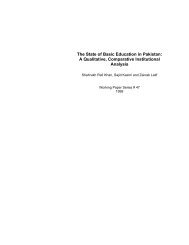
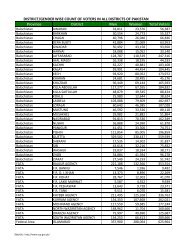
![(October - December, 2010) [13th SDC Special Bulletin]](https://img.yumpu.com/50118608/1/184x260/october-december-2010-13th-sdc-special-bulletin.jpg?quality=85)

